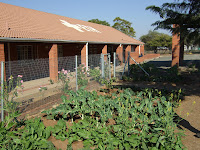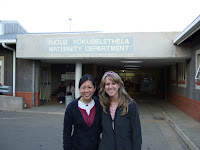
Today I visited a family of six that lives far out in the hills of the community. The
road to
their home was rocky & could almost not be travelled by a 4-wheel drive
bakkie (AKA: truck). The view on the drive was spectacular. Their home was in traditional Zulu style- a
rondavel (a round hut with conical thatch roof) and it was about the size of a large bedroom. There was a dirt floor & the walls encircling us were a mixture of mud & cement. A man, the patient we
were there to visit, was covered in a blanket on a mat on the floor. Beneath the blanket the outline of his body was difficult to trace. He was so thin that the lines were blurred in deciphering where his body began & where a slight lump in the blanket ended. A woman, his wife, held a child. The child had on only a shirt, I noticed as she sat him on the floor. I learned he was 8 months old. Another child, age 3, toddled inside the
rondavel. He was fully dressed, but from behind I noticed his shorts were torn in several places revealing his buttocks. A third child hovered outside, shy, with several neighbor children. I was informed that the family's oldest child was at school.

The father, our patient, had recently been diagnosed with tuberculosis. Mary, taking on perhaps her most enduring role, as home-based caregiver, knelt & sat next to him on the floor. Another home-based caregiver escorted his wife outside. I was explained that this was to secure privacy for the man in case he was HIV infected, and had not disclosed. The patient explained that he had been to the out-patient clinic at the hospital where he was diagnosed with TB. He had been on medications now for 1 week. In South Africa, and particularly in this area, when one has TB the next question asked is regarding the possibility of also having HIV. The patient was of course asked this, and he said he had not been tested. I was explained that he later mentioned being tested & that his results were negative. A South African medical student also visiting
Tugela Ferry, and with me at this time, mentioned that it was not uncommon for people to say that they have been tested and are uninfected even when they have not actually ever been tested. With these statistics, who can blame someone for being afraid.
I have several times on this trip been in a position where I know that I will never fully be able to describe the circumstances of the situation, and this was one of those times. The poverty was palpable, & the reality of it was all consuming. There was very little in the home, a single size bed, cot-like with wooden legs tied together at the corners, a small table which held 2 cardboard boxes, the contents of which seemed to encompass the few kitchen supplies they had. Several tomatoes sat nearby as well as a large, dusty jug of water-resting on the floor. I was told that they had no food. I was left to wonder: was this the literal translation from Zulu? No food? Or did they perhaps say: "little food"? It was hard to know in that instant if I was prepared to meet a family of 6 with no food. Immediately my mind raced: How many Rand might it cost to feed them right now, then tomorrow, and next week?...
The home-based caregiver assited the mother in the administration of her husband's TB medications- one, two, three, four, five pills I counted as she scooped each of them individually on to a spoon and then slipped them into his mouth. He appeared just strong enough to momentarily prop himself up on his elbows, in order to swallow the pills. I was explained that the home-based caregiver asked them about their water source. The woman replied that she normally fetches the water from a local spicket, but since it has been broken she has gotten it from the river. I was told that they normally grow food, but cannot now because there is no water. Again, I wondered: No water? or perhaps they meant, "little water"? My mind suddenly flashes to a movie theatre in the Unites States, with giant 8 dollar jugs of soda and long lines at the snack counter to purchase them. The American cinema in this moment to me, was nothing more than a seemingly unlimited & extravagant buffet of food & drink. I could no more imagine this family in line at the theatre than I could imagine a Monday with no food and no water.
Much more discussion & education took place in the home that was not translated. They wanted pictures taken I was told. I showed the father a picture of his youngest son on my digital camera. He laughed & smiled. Still strong enough to smile, I thought. How will he get his medications when he runs out? I wondered. It was such a long & difficult drive- an even longer & more difficult walk. He'll be stronger by then, I hoped. The mother & children accompanied us back up the road to our vehicle. I see their plot of land, drying brown in the Sub-Saharan, winter sun. Mary pulls out toys to give the children: used ones, presumably donated from America, the hand-me-downs of many children who now have bigger & better toys. One is a McDonald's happy meal prize, another a tiny troll doll with striking blue hair, a picture book, a paper clock with moveable arms, & a catching game with a ball and 2 torch-like plastic mitts. I have seen it before, played by children at the beach.
Mary hands one of the children a loaf of bread and begins packing up large quantities of raisins from a box, into a plastic pitcher & tin bowl brought from the family's home. Kun & I give all the children heaping handfulls of raisins, as the bowl & pitcher are filled beyond their limits. My mind races: Are my hands clean enough to handle their raisins? How long will these raisins even last? Is this all they will eat today? How can I give them more? How far will a loaf of bread go in a family of 6?
I continued to hand out raisins. The mother thanked us, shyly. We thanked her. What had we done really? There was so much to be done. We said our goodbyes. As I wished I had so much more to give, I imagined the asiles at Target & things the family might get there: diapers, baby wipes, big family size boxes of cereal, & shorts with tags that read things like, "size T3." & "wash with like colors." We parted ways, my mind raced, and my hands were sticky from raisins.
 Ethembeni clinic: Yesterday, 7.25.07, we visited one of the 13 satellite clinics operated by Department of Public Health nurses. The waiting room was packed with women, men & children awaiting a visit with the nurse. Some to get ARVs, some for antenatal care, and many for other various ailments. The beauty of this place- is that it is operated by nurses- all 13 of the clinics in fact. The nurse I observed operated like a Nurse Practitioner. It was such a great thing to see, because as far as we have been able to tell- NP is not a role held in South Africa. These lead nurses in the clinics however, may not be called by this title, but they seem to act as such.
Ethembeni clinic: Yesterday, 7.25.07, we visited one of the 13 satellite clinics operated by Department of Public Health nurses. The waiting room was packed with women, men & children awaiting a visit with the nurse. Some to get ARVs, some for antenatal care, and many for other various ailments. The beauty of this place- is that it is operated by nurses- all 13 of the clinics in fact. The nurse I observed operated like a Nurse Practitioner. It was such a great thing to see, because as far as we have been able to tell- NP is not a role held in South Africa. These lead nurses in the clinics however, may not be called by this title, but they seem to act as such. 


















































